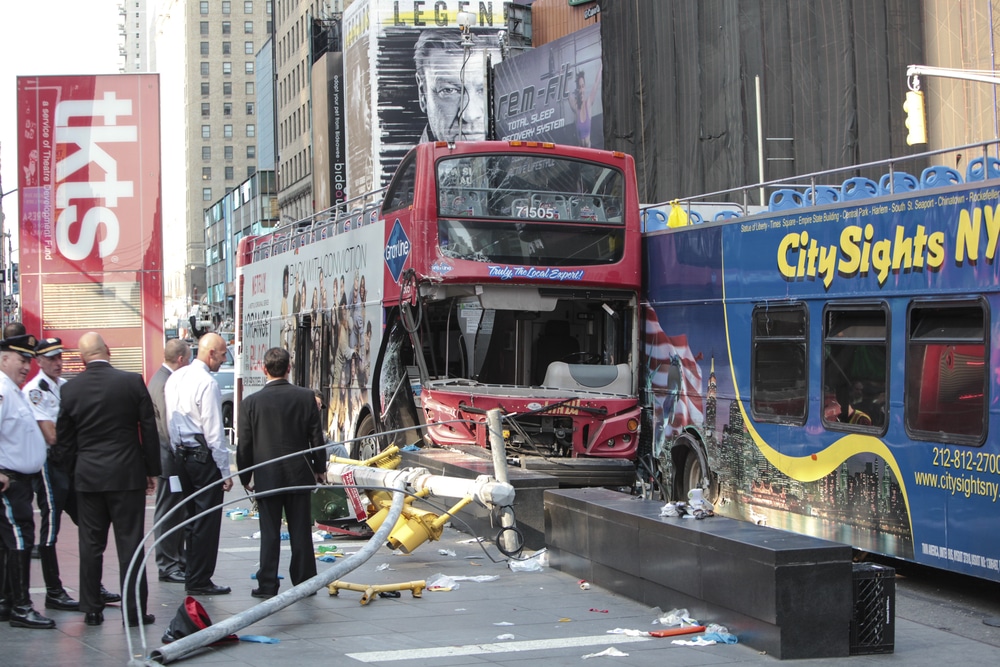Becoming injured in a bus accident can be a harrowing experience. While you cannot change the past, you can understand your legal rights and options to move forward after this life-altering event.
A New York bus accident lawyer can advise you on whether you have grounds for an insurance claim or legal action after a bus injury. They can explain the legal process and your potential options.
Learn what victims need to know, then contact a bus accident lawyer in New York for assistance.
Who Is Liable in a Bus Accident?

Bus accidents can occur due to a range of causes and are tracked annually by safety agencies. In 2021, approximately 119,000 injury crashes involving large trucks or buses occurred throughout the U.S. Of all buses involved in fatal crashes between 2010 and 2021, 36% were transit buses, while 11% were intercity buses.
Determining who might be liable in your bus crash is generally the first step in seeking compensation. Any of these parties may be partially or fully liable:
- The bus driver for violating traffic laws, driving under the influence of drugs or alcohol, or otherwise causing the accident
- The bus company for failing to properly train the driver, requiring the driver to work unsafe hours, etc.
- Another driver who struck the bus in a collision
- A bus passenger who distracted the driver, leading to an accident
- A pedestrian who walked out into traffic, leading the bus driver to swerve to avoid them
- A manufacturer that produced defective bus parts that caused the accident
A New York bus accident lawyer can review the circumstances of your accident and the evidence available to help pinpoint liability. Under New York’s pure comparative negligence policy, multiple parties can assume partial fault for an accident. Even if you were partially at fault for the bus crash, you may still be eligible to pursue compensation, though it would be reduced by your percentage of fault.
Understanding Options for Compensation After a Bus Accident
You may have the right to pursue compensation through an insurance claim, personal injury lawsuit, or both after a bus accident. A Queens bus accident lawyer can explain potential options for compensation.
You might pursue an insurance claim through the at-fault party’s liability insurance or through another form of coverage. Under New York’s personal injury protection (PIP) laws, every driver must carry their own insurance to cover their injuries in an accident, regardless of who was at fault. This means that even if another driver were responsible for the accident, you generally would not file a claim through their insurer.
You may be able to claim reimbursement for medical expenses through:
- The bus operator’s commercial liability insurance
- A third party’s liability insurance, such as a negligent bus parts manufacturer
- Your own auto insurance (PIP or medical payments coverage)
- Your health insurance
If insurance does not adequately cover your expenses from the accident, you may consider a lawsuit with the help of a bus accident lawyer in New York. Through these personal injury claims, plaintiffs can seek both economic and non-economic damages.
Economic damages cover the direct expenses you incurred from the accident, such as medical bills, lost wages, and related expenses. Non-economic damages help make up for the physical and emotional costs of the accident, such as pain and suffering or loss of quality of life.
A New York bus accident lawyer can provide guidance through the compensation recovery process and help you understand the potential value of your bus accident injury claim.
Understanding New York’s Statute of Limitations for Bus Accident Lawsuits
New York follows a three-year statute of limitations for the majority of personal injury lawsuits. If you want to pursue legal action against the liable party or parties in your accident case, make sure to file within three years of the accident date.
If you are seeking legal action against New York City or New York State, you will have just 90 days to give notice, then another year after this deadline to file the lawsuit. Some buses are owned by the city or state, meaning that entity might be liable for the accident in certain cases.
In the weeks and months after the accident, you may not initially consider pursuing legal action. You might be more focused on recovering from injuries than on seeking compensation. This is why it is important to consult an attorney early on to discuss your rights and legal options. Your legal representation can help you consider all potential methods of seeking compensation and avoid missing any relevant deadlines.
Seek Legal Assistance From Our Bus Accident Lawyers in New York

Bus accident cases are often overwhelming, with multiple parties sharing liability or the involvement of local governments or municipal agencies. Working with an experienced New York bus accident lawyer can help you understand your options.
At Elliot Ifraimoff & Associates, P.C., we represent victims of motor vehicle accidents throughout New York City and the surrounding areas. Learn more about the benefits of hiring an auto accident lawyer after a bus crash, then contact us today at 718-205-1010 for a free case evaluation.
Preguntas frecuentes
How much compensation can you seek after a bus accident?
The amount of compensation you can seek after a bus accident depends on the severity of your injuries, your method of seeking compensation, the total value of your damages, and more. An attorney can conduct an accident investigation to help assess potential damages.
How many bus accidents happen each year?
It is difficult to pinpoint the number of bus accidents that happen each year because federal agencies often group bus crashes with large truck accidents. In 2021, there were approximately 192,000 non-fatal crashes involving buses and large trucks across the U.S.
What are victims’ rights after a bus accident?
Victims’ rights after a bus accident include the right to seek compensation from the negligent party, either through an insurance claim or lawsuit. Your New York bus accident lawyer can help advocate for your rights throughout the compensation process.

